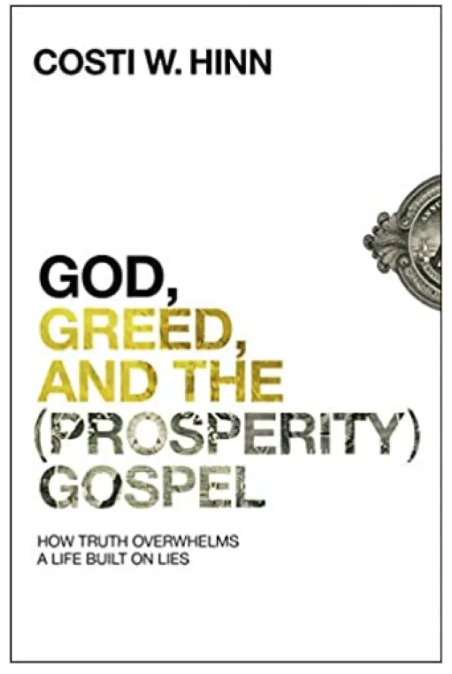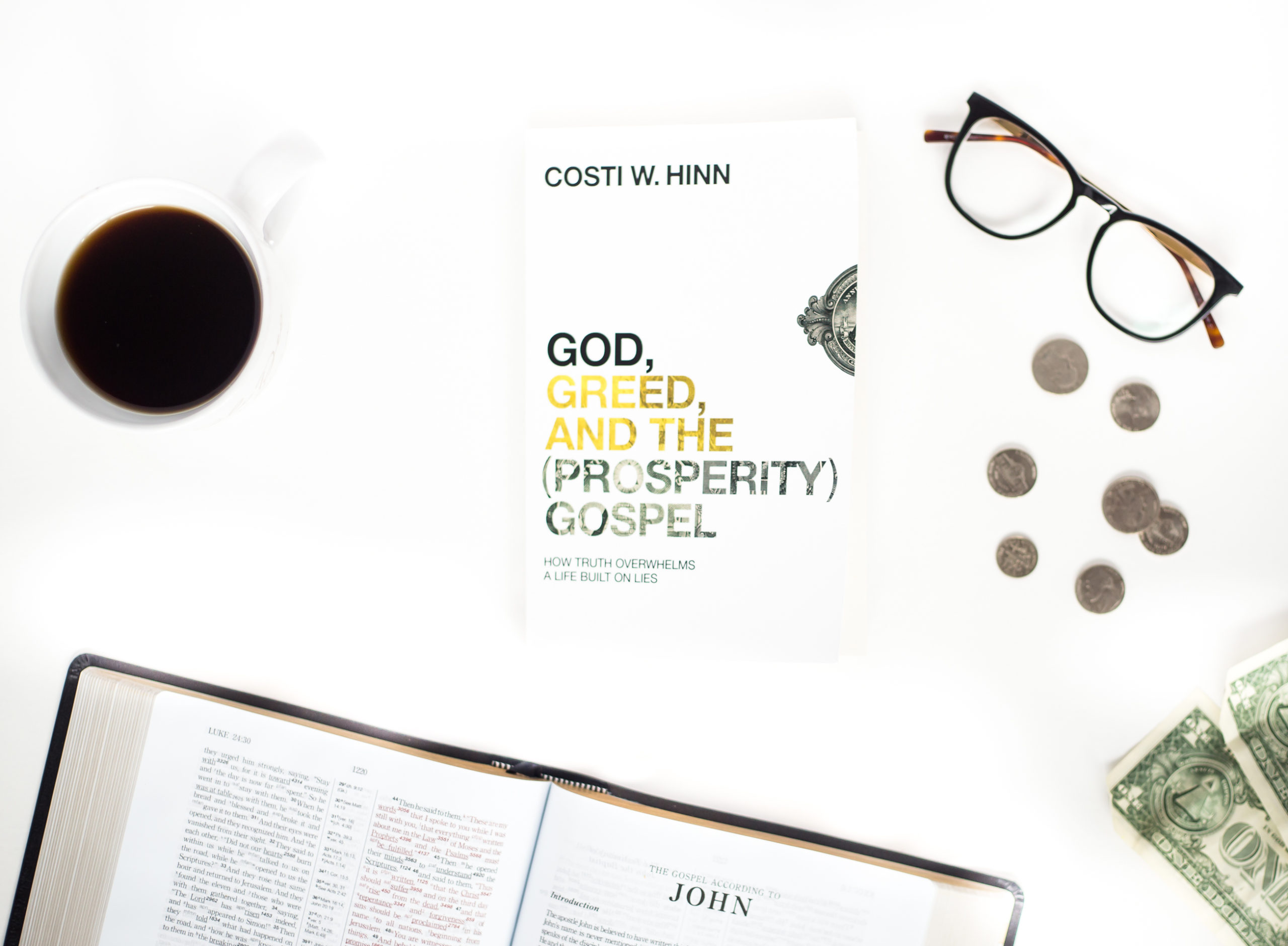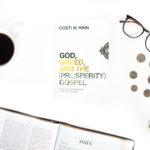This post contains affiliate links
God, Greed, and The (Prosperity) Gospel is the debut title by pastor Costi Hinn. You may recognize Hinn’s last name as it is the same last name of popular prosperity preacher, Benny Hinn. Costi is Benny’s nephew and as such, grew up entrenched in the prosperity gospel movement. God, Greed, and The (Prosperity) Gospel is a fascinating look at how God worked in Costi’s life and brought him out of the prosperity gospel movement into a life that is now shaped by the true biblical gospel.

At one point in his upbringing, Costi began to observe that his uncle lived an affluent lifestyle in every sense of the word. All the while, some of his staff lived a nearly impoverished lifestyle all in the name of ministry. Observations such as this resulted in Costi questioning the validity of the prosperity gospel. Although I’m not super familiar with the person and ministry of Benny Hinn, this observation reminded me of the time when his children Josh and Eleasha briefly attended the same Christian school that I did.
Eleasha was in the same grade as my sister so she came over to our house a few times chauffeured to and from it by her nanny. Eleasha seemed to be well off by the clothes she wore and the designer purse she carried yet her nanny wore regular, nondesigner clothes and drove an older vehicle with chipped paint. I wondered why the nanny didn’t seem as well off and now I realize she also may have viewed her service to the Hinn family as an act of ministry.
Another incident that led to Costi questioning the prosperity gospel was his attendance at Dallas Baptist University. While there, Costi participated on the baseball team and was coached by a man who loved God and often spoke of His sovereignty. Although he didn’t quite understand how God’s sovereignty worked at the time, it is a doctrine he currently cherishes.
His words on page 100 are evidence of this. He said, “When we get the sovereignty of God wrong, we get God wrong. When we get the abundant life wrong, we get Jesus wrong. When we get faith and confession wrong, we get salvation wrong. Why is that a huge deal? Because all roads the prosperity gospel paves lead to hell.”
On page 159, he made the assertion that all believing Christians have at some point participated in the prosperity gospel. Regarding this, Costi wrote, “This may sting a bit, but we need to rip the bandaid off here: we did this! By we, I mean all of us who profess to be Christians. We’ve collectively played some role in the rise of prosperity theology at some point. Whether by passive silence or active participation, we allow false gospels to get a footing.
We need to take responsibility together, whether we believe we should or not, to eradicate evils like the prosperity gospel. That begins with committing ourselves to defending the true gospel at all costs.” Upon first reading that, I thought I hadn’t participated in actively propagating the prosperity gospel but I realized I had at times been a passive participant. Costi’s words served as a helpful reminder of my need to grow in my understanding of the true biblical gospel and to contend for it at all costs.
It was sweet to read about how Costi met his wife Christyne at a baseball stadium in Lake Elsinore, CA. I grew up near Lake Elsinore and attended many baseball games at that stadium so learning that Costi and Christyne met there was a fun discovery. The Lord bringing Christyne into Costi’s life was another means which He used to reveal the true biblical gospel to Costi.
As he began getting to know Christyne, he struggled with the idea of bringing her around his family. Costi knew that they likely wouldn’t approve since Christyne held different theological positions on many things. Christyne also didn’t possess the gift of speaking in tongues which many prosperity preachers believe is a requirement for salvation. It was encouraging to read how the Lord worked to unite Costi and Christyne together and bring them to the point where they are now.
As much as God, Greed, and The (Prosperity) Gospel is an autobiography it is also a testament to God’s grace and kindness in drawing sinners to Himself. It is encouragement for those who have come to know Christ to keep delighting in Him especially as they pray for the souls of those dear to them who do not yet know Him. God, Greed, and The (Prosperity) Gospel also contains a great deal of theology which was delightful to read.
Costi addressed topics ranging from the sovereignty of God to a biblical view of finance. God, Greed, and The (Prosperity) Gospel is full of wisdom in these areas. Page 190, in particular, contains many powerful points some of which include: “Wealth is not a sign of elite spiritual status – having Christ is,” and “If you’re wealthy, you were meant to build God’s kingdom, not your earthly empire.”
One of the aspects of Costi’s story that struck me is that he NEVER speaks poorly of his family. He is truthful and honest about the unbiblical practices that have occurred by his family members who are involved in the prosperity gospel movement but he NEVER slanders or gossips about them. It is patent when you read Costi’s words about his family that he has a deep, genuine affection for them which mirrors the deep affection he has for Christ. I hope to have this same gospel affection for those in my life, especially unbelieving family members.
God, Greed, and The (Prosperity) Gospel concludes with ways in which Christians can reach those who are caught up in the lies of the prosperity gospel movement which I found to be extremely helpful. On page 201, Costi wrote, “We all have to ask ourselves this important question when trying to reach people: am I trying to win the person, or am I just trying to win an argument? Your answer will reveal your heart. God is in charge of the timing. We are in charge of loving people enough to share the truth.”
I love that within this same section, Costi encourages Christians to cultivate relationships with non-Christians in a personal setting rather than trying to debate them over social media and/or text messaging. Regarding this, he said, “Maybe you have, but I have never won someone to the truth or seen God open the eyes of the spiritually blind person by exploding on them via Twitter or Facebook. . . Seeking a private audience should be viewed as a bridge-building strategy, not a one-and-done mic drop so you can serve them up a monologue entree of your opinion,” (pg. 204-205).
On the following page, Costi spoke further about bridge-building when he encouraged his readers to ask questions of those with whom they disagree. He calls this the “HMU approach” in which HMU stands for Help Me Understand. He said, “When we ask genuine questions in an effort to understand the person, it shows we care. This allows us to have a more fruitful discussion and preserve the relationship for future conversation.
If you’re trying to reach someone, they need to know you understand them. Understanding doesn’t mean you are agreeing with them or condoning any behaviors you oppose. It is simply a mark of your maturity and self-control when you can manage your emotions enough to understand someone you differ with,” (pg. 206).
I greatly enjoyed God, Greed, and The (Prosperity) Gospel, and am pleased to give it my highest recommendation. Costi recently announced via his social media accounts that a second book is in the works and I am eagerly anticipating its release.
To hear Costi share his story, check out this episode of the Becoming Something podcast.










